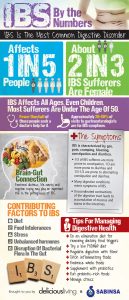Coping With IBS: Irritable Bowel Syndrome
0IBS is the most common digestive disorder, affecting 1 in 5 adults—and 2 out of every 3 women.
It affects all ages, and most sufferers are under the age of 50.
Yet, fewer than 50% of people who suffer from IBS seek help.
Get the facts on IBS on the infographic above brought to you by Sabinsa and Delicious Living.
Click here for bigger size of infographic: 🙂
What causes it, and how can it best be managed?
IBS is caused by:
- Diet
- Food Intolerances
- Stress
- Unbalanced Hormones
- Disruption of Bacterial Flora in the Gut
Did you know?
Your gut and brain are connected by what is known as the gut-brain axis.
Your gut is known as your second brain.
Imbalances in your gut can affect your mood, and imbalances in your bacterial flora may lead to IBS.
What are the symptoms? Check out the infographic above, or click here for a larger view:
What are some solutions for IBS?
- Do an elimination diet
- Try a low FODMAP DIET*
- Regulate digestion with fiber
- Try to reduce or eliminate inflammatory foods (sugar, etc.)
- Embrace real, whole, and natural foods – it can make a HUGE difference!
- Supplement with probiotics and FOS (foods that feed friendly bacteria like onions)
- Manage your STRESS levels – This can be a game-changer! Excess cortisol can shut down digestion.
- Eat probiotic-rich foods like yogurt (low to no sugar, kefir, kimchi, etc.)
*What is a FODMAP diet?
“FODMAP refers to foods that contain certain short-chain carbohydrates, and stands for Fermentable Oligo-, Di- and Mono-saccharides, and Polyols. The FODMAP theory suggests that when individuals who suffer visceral hypersensitivity and/or motility dysfunction consume high levels of FODMAPs there is an increase in intestinal distension which contributes to digestive symptoms.”**
Learn more here:
**Managing stress may be a game-changer too. Many people who have chronic stress can develop conditions like IBS, chronic fatigue, fibromyalgia, and beyond. Managing stress means learning new skills like mindfulness, stress management, self-care, mediation, etc. These practices can help create a healthy gut and help support symptoms associated with conditions like IBS. There may be multiple causes of certain conditions, and but chronic stress is implicated in most chronic conditions as well.
Contact me if you would like help learning how to manage your stress better in order to feel better.
High-quality supplements offered by the natural foods industry changed my life. I am very sensitive to artificial ingredients, GMO’s, fillers, and low-quality ingredients (did you know if you are sensitive to something, it can create inflammation in the body – a big no-no!).
When I developed chronic fatigue, I turned to the natural foods industry to seek answers. I began working in the supplements department of a natural foods store, and taking high-quality supplements (I’ve tried hundreds of them to find which ones work for me), and by learning how to eat well, I improved my energy levels and well-being significantly. You can read more about my journey here and in my book, The Memory of Health (see link below).
I cannot take prescription drugs, so for me, having access to high-quality supplements was a game-changer.
In my quest for answers to my health challenges and well-being, I became a Conscious Consumer.
I take them every day, and they make a BIG difference in the quality of my life and well-being. I discuss supplements and holistic living in great detail in my book, The Memory of Health.
You can find my book here.
#LuluAuthor Edie Summers shares advice for those suffering from a chronic condition in her book #TheMemoryofHealth: https://t.co/auyNYL75hFhttps://t.co/hbMcmygIlr
— Lulu.com (@Luludotcom) March 28, 2017
**credit/reference: Bolen, B. (2016). Does a low FODMAP diet help IBS? http://bit.ly/2ogk85N




Comments